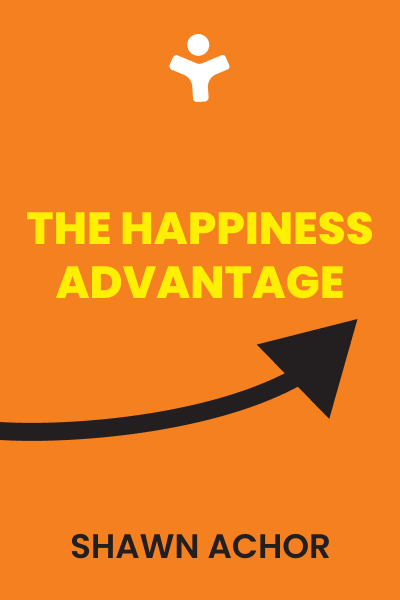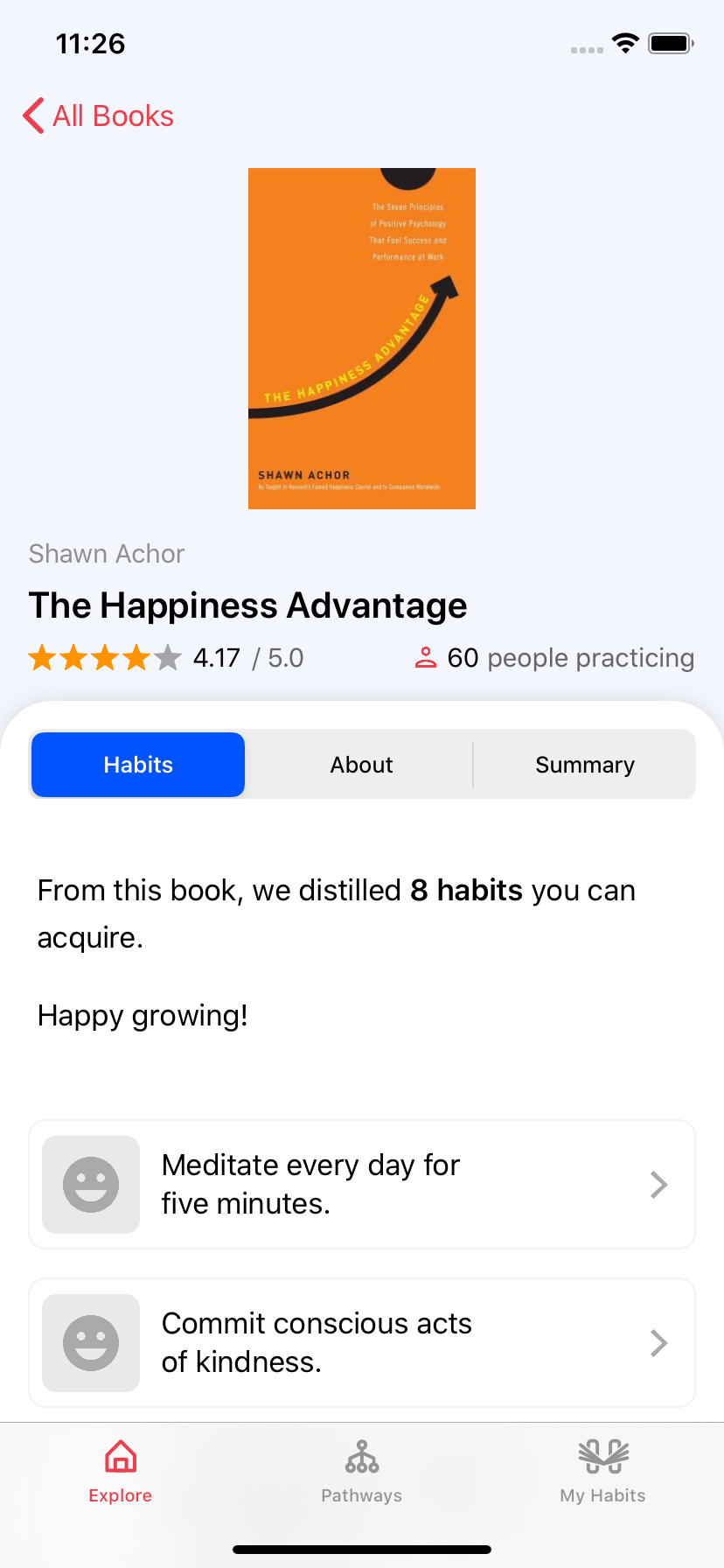
The Happiness Advantage: The Seven Principles of Positive Psychology That Fuel Success and Performance at Work
by Shawn AchorMost individuals follow a simple formula that has been engraved in our society: work hard to succeed first, and only then will you be happy. However, it’s often the other way around - optimism and happiness should fuel the performance giving us a competitive advantage, also known as the Happiness Advantage. Waiting to be happy limits our potential for success. But once we are happy, this positivity motivates us; we become more creative, resilient, and productive.
Train Your Brain
“Even the smallest shots of positivity can give someone a serious competitive edge.’’
We believe that happiness orbits success, and if we work hard enough, success will come, and we will be happy. Meaning we see happiness as the effect. Most of us believe that success is a fixed point of the universe, with happiness revolving around it. However, happiness seems like something difficult to reach. Some even treat it as a weakness, a sign that we’re not working hard enough. This thinking leads us to undercut our mental and emotional well-being and chances of success and goal achievement.
The opposite is true. When we are happy and have an optimistic mindset, we are more intelligent, more motivated, and thus become more successful. In this case, happiness is the cause of success. When you look at the most successful people, they see happiness as something to leverage and use in the best way possible to see possibilities. That is what drives them.
Happiness is relative - it is based on how we feel about our own lives and measured by pleasure, engagement, and meaning. Whoever pursues all three live their lives to the fullest. It has even been proven that happy workers have higher productivity levels, perform better in certain positions, and receive higher salaries.
On the other hand, negative emotions can narrow our thoughts and actions. Positive emotions broaden our perspective, and we become more creative. They also flood our brains with dopamine and serotonin, which help us learn better, organize new information in the brain longer, and retrieve it faster. Positive emotions can expand our peripheral line of vision, and we notice things that we wouldn’t process if we were in a bad mood.
Even from a young age, we can use these positive emotions to solve complex problems. If we think about the happiest days of our lives just before an important exam, we can perform better. Even the most miniature shots of positivity can give someone a severe competitive edge. A happiness booster is also very subjective. For some, listening to a particular song can boost positive emotions; talking to a friend or family member, playing tennis, or going for a walk. It would help if you found yours too.
Actions to take
Adjust Your Mindset to Give You the Power to Be More Fulfilled and Successful
“It’s not the weight of the world that determines what we can accomplish. It is our fulcrum and lever.”
If you played on the seesaw before, you’ve probably heard of the fulcrum: the exact center between two seats. If two kids sit the same distance from the fulcrum on opposing seesaw seats, they will balance each other. But the closer we move the center point, or the fulcrum, toward one child, the easier that child is to lift.
In other words, by shifting the point around which energy is applied, we can effectively turn the seesaw from a balancing scale into a powerful lever. This also explains how our brains work. We can maximize our potential quickly. The belief of how much potential power and possibility we have is our lever. And the mindset with which we generate the ability to change is our fulcrum.
We can similarly maximize our potential and power by changing the mindset or the fulcrum. The potential is not fixed, and thus, by changing our perspective, we can change our abilities. Shifting our fulcrum towards a more positive mindset produces better results.
We can easily change our reality by repeating certain activities or positive affirmations. For example, if you believe that running 3km every day will help you burn 1000 calories, your brain will perceive running as something positive and beneficial, as it will help you lose weight and that many calories. More than the activity itself, the mental construction of our daily activities defines our reality. You changed your mindset and thus altered the reality.
You can also change the results with your belief. If you find your free time a waste of time, this activity would be just that. But if you switched your mindset and believed that free time could be productive and will help you recharge your batteries, this free time would be good for you. This can significantly enhance your performance and change the outcome. Switching your focus on something positive can change your perspective and reality.
This also applies when you’re stressed and worried. If you have to present in front of a large audience and believe you’re a weak public speaker, just focus on how prepared and knowledgeable you are about the topic. Shifting your focus on something positive can help you deliver the presentation well.
If you want to improve your abilities, you must believe in your capacity and skills to do so. Having a “growth” rather than a “fixed” mindset opens new amazing opportunities for you.
Happiness also comes from viewing your job as more of a calling than a chore. Through this, you’ll feel more fulfilled as you believe your work contributes to the greater good.
Actions to take
Learn how to spot positive patterns of possibility
“The more your brain picks up on the positive, the more you’ll expect this trend to continue, the more optimistic you’ll be.”
Playing a video game for too long can change how you see the world around you. If you play the Tetris game for a few hours, you would probably see those shapes from the game in the real world. Or maybe you would dream about shapes falling from the sky. This often happens because your brain’s wiring changes. Your brain can’t distinguish between video games and real life. This repeating pattern doesn’t apply to video games only.
Our brains can quickly get stuck in patterns of viewing the world. This is what the author calls Tetris Effect. It is a metaphor for how our brains dictate how we see the world around us. You can’t break a habit of thinking or behaving, either positive or negative. Most of the time, we scan the environment around us, and we immediately notice everything negative and stressful. That undermines creativity and lowers motivation, making it hard to achieve goals.
You can spot the Tetris effect in some professions. A tax auditor’s job, for example, is to find accounting errors. Their brain is already wired to look for the negative. And this is easily reflected in their lives and families. They only notice those lower grades on their kids’ report cards, and they rarely see good grades. This often leads to depression.
But we can quickly train our brains to shift into a positive Tetris effect: to scan the surroundings around us and see opportunities that fuel success and growth. Focusing on the positive only gives us happiness, gratitude, and optimism. Studies have also shown that people are more energetic, emotionally intelligent, forgiving, and less likely to be depressed.
When you expect a positive outcome, you will train your brain to recognize that outcome once it comes. Here is how you can prepare your brain for a positive Tetris effect:
Actions to take
Learn how to recover from failure quickly and become happy
“The point is that when faced with obstacles or failure, succumbing to helplessness keeps us down on the mat while looking for the path of opportunity helps us pick ourselves up.”
Recovering from adversity or a painful situation is complicated, and it takes time. Our brains, when in crisis, mostly see the negative, and we get to think that we are far worse off. Thinking positively, on the other hand, brings us from failure to a better, happier state of mind where we accept failure as a stepping stone to success.
Mindset plays a crucial role. When the event happens, positive or negative, our experience of the event influences what happens next. Experience is subjective, and thus if you face a problem immediately, you can quickly bounce back from failure. Failure is good; it moves us forward. The faster you fail, the quicker you can move on to the next opportunity. Successful people like Michael Jordan, Indra Nooyi, and Thomas Edison used failure as their stepping stone for greatness and success.
Turning adversity into opportunity is a learnable skill. Belief is our reaction to an event, it’s not a fact, and most problems are not permanent, so you might as well use them to your advantage.
Actions to take
Focus on small, manageable goals
“One of the biggest drivers of success is the belief that our behavior matters; that we have control over our future.”
You have probably watched the Mask of Zorro. In the movie, a masked hero Zorro fights for those who could not fight for themselves. However, before Zorro became so powerful and skillful, he had gone through many struggles. With the help of Don Diego, Zorro learned how to be in control. One day Don Diego drew a circle in the dirt. He told Zorro that he could only move on to the next level once he learned how to fight within the circle. The Zorro Circle is a metaphor for achieving the most ambitious goals in our lives, jobs, and careers by taking a small step at a time and focusing on what we can control.
Every time you try to achieve something, start with a small circle and master things within that circle first. By concentrating your efforts on small manageable goals, you learn how to be in control. You first limit your scope of effort, and once you see that it works, you expand gradually to a larger area. Eventually, you will reach your intended goal.
People with an internal locus of control believe their actions directly affect their outcomes. They tend to be less stressed and more satisfied at work. On the other hand, people with an external locus of control are more likely to believe external forces control their daily events. When you have an internal locus of control, you seek ways to improve when an outcome is not the best. Our actions shape our lives and can only spur us to work harder. When we see this hard work pay off, our faith in ourselves grows even more.
In tough, stressful times, our emotions take control, and we no longer can think logically. Emotions quickly take over, and decision-making and productivity decrease. If we could learn how to put those emotions aside, we could make better decisions.
Everything starts with a small first step. That is why you should not rush when you decide to do something. It’s hard to run a marathon if you have never run before. If you choose to do it that way, it can quickly turn to failure and depression. However, when you start small, you are more likely to succeed. You can control many things and see significant changes when focusing on manageable things.
Actions to take
Adopt new, healthy habits that lead to happiness
“If you can cut the activation energy for those habits that lead to success, even by as little as 20 seconds at a time, it won’t be long before you start reaping their benefits.”
We all know that we should exercise regularly, sleep eight hours, and eat healthy food. But having knowledge is one thing; acting on it is completely different.
When performing an activity, we tend to follow the path of least resistance. For instance, we watch TV because it’s effortless to do. If we want to break bad bad habits and establish new healthy ones, we need to rewire our brains. Simply using willpower is not enough because the more we use it, the faster it gets worn out.
The first step is always the hardest. Active leisure such as hobbies, games, and sports enhance our engagement, concentration, and motivation. But those activities require more initial effort. For example, if you want to go for a bike ride, you need to get the bike out of the garage, then you need to lock the house, and so on. Even though this takes 20 seconds of your time, it’s still too much work. We are generally drawn to easy and convenient things, such as watching TV since it is just in your living room, and the remote is easy to find.
We can work with our innate mechanisms. It all comes down to reducing the activation energy for habits you want to adopt and raising it for those you want to avoid. For example, if you hide unhealthy food and keep it out of sight, you will eat less. If you make it difficult for yourself to log into your email, you will check your inbox less often. Similarly, putting your workout clothes next to your bed will push you to the gym. You alter the time it takes to get or do things.
Actions to take
Expand your social support network
“And in everyday life, both at work and home, our social support can prove the difference between succumbing to the cult of the average and achieving our fullest potential.”
We often forget about community and social support during challenging and stressful times. People around us are crucial to our success. However, when the deadline looms, we start spending time alone. The most successful people do the opposite; they hold tighter to their social support. It makes them happier, more productive, engaged, energetic, and resilient. Data shows that spending time with other people during those stressful times can reduce anxiety and improve focus and concentration. Yet so many of us choose loneliness. Social support is good for us and our progress. It can help you relax and reduce stress during difficult times. You can recharge your batteries.
Workplace gatherings, college parties, and study groups are all beneficial. That is why all major companies have those community spaces where employees can play table tennis, play games, or just chat. One CEO of one company saw that employees were spending a lot of time socializing on stairways. So, the CEO decided to expand the stairways, and he added a coffee machine to encourage those gatherings. Strong relationships can help us become more effective. Even a tiny hello and chit-chat in the office can help you relax and reduce stress levels. Writing an email of praise or thanks to a friend can also lead to happiness.
Actions to take
Don’t just read. Act.


